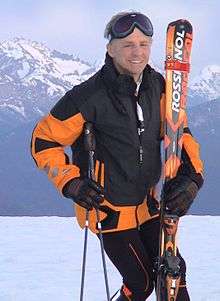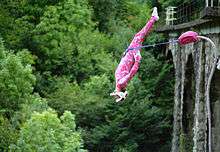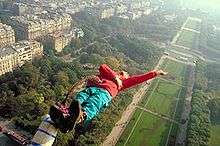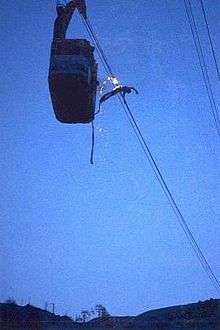Thierry Devaux
| Thierry Devaux | |
|---|---|
 | |
| Residence | Dubai, UAE - France |
| Occupation | Event Manager - Project Manager - Pilot |
| Known for | Bungee jumping shows and landing on Statue of Liberty. |

Thierry Devaux was born on November 16, 1959 in Bourg-en-Bresse. He developed acrobatic bungee jumping. His landing on the Statue of Liberty was the feat that gave him a mainstream awarenesse and designed several techniques to transform bungee jumps into sport field.
Personal
Main Spirit
Jumping into space does not really interest Thierry Devaux beyond his first jumps in 1989. He uses elastic cord to perform an aesthetical move akin.[1][2] He performs 8 to 12 acrobatic jumps during two-hour training with the help of his Jumar or with a winch to lift him up.[3] Bungee jumping is an elite sport and requires intensive training.
Bungee jumping is such a high sensation sport that one cannot cheat on oneself or on the others.

He admits that he is always afraid. He stated that "Frightening oneself" is stupid. The goal is to find the perfect balance between his enjoyment of weightlessness with the reverse acceleration effects, and his own, personal apprehensions. He stopped counting his jumps after the thousandth one, after sixteen years of training.
Example of figures
Backward somersault: three somersaults during the first fall and eleven for all the bounces.
Other figures: forward pike, reverse kick, forward spiral, one foot backward, etc.…
Thierry is tied around the pelvis, in the area nearest to his center of gravity because figures performed with ankle attachments are not very interesting. The elastic rope is only 8 to 10 meters long in order to ensure a good ratio between catapult effect and low weight.
Jumps
Technique

Thierry used a dynamometer and a variometer as early as November 1988 to measure the distortion of an elastic rope, the various bounces and the forces that the jumper has to endure.
A climbing rope can accommodate a 30% stretch in case of a fall in order to avoid body trauma. An elastic rope typically stretches by a factor of 3.5~4.5 of its initial length (250~350%).
Medical aspects
Negative G-force (pressure of the blood towards the head) is much more beneficial to the body than positive G-force (the blood runs toward the feet). Negative G-forces can be reached during bungee jumps during approximately a second when the jump is over a hundred meters high. These are less severe strains than those of some amusement rides in parks. The researches evidenced that the pressures on the vertebral columns are more important during the waist-attached jumps than the more centered jumps with ankle ties.
Risks and dangers
"Danger starts when you go past the risks".
All bungee jump accidents were the result of human factor: elastic cord ill suited to the weight or the height of the jump, untied jumpers, cuts from the rope near the elastic cord…
The strength of the bungee jump equipment is well beyond the accepted dynamic limits. There is almost no external risk. The remaining factor is the psychological one, which is the hardest to overcome at any height.
Others
National Ski Instructor
Pilot
Ex Vice-President of the Bungee Jumping Federation
[4]
[5]
Monuments and shows
Eiffel Tower
On October 27, 1991, Thierry Devaux, along with mountain guide Hervé Calvayrac, performed six figures from the second level of the Eiffel Tower, at 115 meters.[6]
Olympic Games
On February 1992, Thierry, with mountain guide Alain Ledoux, performed a series of nine figures during 1992 Winter Olympics from a cable car of Val-d'Isère on the night of Alberto Tomba's historic victory.[7]
Golden Gate Bridge
On June 1992, with his lifelong coach Martine Giroud and following an ill-prepared attempt, Thierry made six figures 90 meters above the Pacific from the Golden Gate Bridge.[8]
Brooklyn Bridge
On June 1993, following thirteen reconnoiters inside the metal structure and with the help of mountain guide and spelunking instructor Simon Destombes, he performed eight jumps above the East River from Brooklyn Bridge.[9]
Statue of Liberty
Thierry landed a paramotor on the torch of the Statue of Liberty on August 23, 2001, after taking off from New Jersey. The goal of this landing was to perform three figures by directly climbing through his bungee. There were several confusions regarding the paramotor and the acrobatic jumps. Contrary to what some big US media reported, Thierry did not ever parachuted.[10]
- 1st Attempt at the Statue of Liberty
In 1993, Thierry Devaux spent the night alone inside the Statue. He climbed all the way to the flame for a technical scouting. At 8.00 a.m., he met the only cleaning man allowed to polish the plated flame once a week since 21 years. The police were baffled and the matter was closed.
- 2nd Attempt at the Statue of Liberty
In 1994, after another night in the national monument, he was waiting inside the flame with a friend and 60 kg worth of equipment. He was accidentally discovered by the shooting crew of an advertisement. The police took the matter seriously this time when finding him yet again inside the flame despite the increased security measures. A complaint was lodged but no case was made against him even seven years later. The matter was hushed up by the two parties and did not get media coverage.
- 3rd Attempt at the Statue of Liberty
He took off 1.7 km from Liberty Island in November 2000, and for approximately one minute flew over the flame - a mere centimeters above - together with his acrobatic gear and his rope, but could not land because of strong winds. He finally jettisoned his bungee into the sea and landed on a golf course construction site in Bayonne, New Jersey. The police did not detain him.
- 4th Attempt at the Statue of Liberty
On August 23, 2001, after having taken off under a light breeze and having flown over the same seaway, he was in front of the flame at 9:15, but the wind had completely dropped for several seconds. The first approach was too high by 1.50 meter. After a second nightly aerial approach with a figure of eight at 21 km/h instead of 5–7 km/h, he landed flat but could not catch the torch barrier. He then stayed hanging four meters under the flame. He would not be able to perform the three acrobatics that he had prepared for seven years. He was too angered by the impossibility to perform that he forgot to abseil on his own, as was planned after the three jumps. He still blames himself today for not abseiling then.
He waited the arrival of two ropeless submariner police officers for more than half an hour. The police then organized a "perp walk" to the boat at 3.30 pm. Thierry did not say a word until 9.30 pm, after the end of the evening news. During the afternoon press conference, Mayor Rudolph Giuliani stressed the heroism of the NYPD. The next day, the two police officers were put under TV silence following a phone call from their superiors, a few second before their group interview. Contrary to what has been stated, the judges allowed Thierry to remain free in the State of NY. Following September 11, Judge Eaton sorted out all the confusions and decrees the judgment in favor of Thierry. The charge of deterioration of the Statue was not upheld, and he was fined $7,065 for the paramotor landing. The judge asked that the fine be covered by the auction of the equipment. The media has overshadowed Thierry's message against anti-personnel mines.

Notes and references
- VSD : November 14, 1991 / France
- Dauphiné Libéré : March 31, 1992 / France
- Dauphiné Libéré : April 1992 / France
- La Tribune Républicaine : 1993 / France
- Le Matin : September 19, 1993 / Switzerland
- Le Dauphiné Libéré : Aout 2001/ France
- Parapente Mag : January 2001 / France
- Tribune de Genève : December 28, 2001 / Switzerland
- Dauphiné Libéré : Octobre 7, 2001 / France
- L'Essor savoyard : September 2001 / France
- Dauphiné Libéré : August 24, 2001/ France
- NewLook : March 2001/ (USA &) France
- Le Figaro : August 24, 2001 / France
- Investor's Business Daily : August 24, 2001 / USA
- Financial Times : August 24, 2001 / USA
- The Washington Post : August 24, 2001 / USA
- New York Post : August 24, 2001 / USA
- World Journal : August 24, 2001 / China-USA
- Daily News : August 25, 2001 / USA
- Brooklyn Eagle : August 24, 2001 / USA
- Daily News : August 24, 2001 / USA
- El Diario : August 24, 2001 / Spain + USA
- USA Today : August 24, 2001 / USA
- The New York Times : August 24, 2001 / USA
- Newsday : August 24, 2001 / USA
- Newsday : August 24, 2001 / USA
- Hoboe Pyckoe Cjiobo : August 24, 2001 / Russia
- The New York Times : August 24, 2001 / USA
- Corriere della Sera : August 24, 2001 / USA
- MSNBC : August 2001 / USA
- NBC : August 24, 2001 / USA
- Sky News : August 23, 2001 / UK
- BBC News : August 23, 2001 / UK
- ABC News : August 24, 2001 / USA
- BBC Mundo : August 23, 2001 / Argentina
- Cyberpresse : August 23, 2001 / Canada
- TF1 : October 31, 2002 / France
- RadioCockpit : August 2001 / Canada
- YpanBEC-ckaxnte : August 24, 2001 / Russia
- Terra : December 16, 2001 / Peru
- Lenta.ru : August 23, 2001 / Russia
- Suara Merdeka : August 25, 2001 / Indonesia
- People : August 24, 2001 / USA
- Poko`ritel : August 2001 / Czech Republic
- Corriere della Sera : August 2001 / Italy
- Ananova : August 2001 / UK
- Neue Westfälische : August 2001 / Germany
- SME : August 2001 / Czech Republic
- Poder : August 24, 2001 / Portugal
- Online Athens : August 23, 2001 / Greece
- ChinaDaily : August 2001 / China
- Terra : August 23, 2001 / Argentina
- The Holland Sentinel : August 24, 2001 / Nederland
- News Interactive : August 2001 / Australia
- Plus Estadao : August 2001 / Portugal
- La Segunda : August 26, 2001 / Spain
- BBC Brasil : August 2001 / Brazil
- Aftonbladet : November 22, 2002 / Sweden
- SouthCoast Today : August 2001 / Australia
- 20 Minutes : August 23, 2001 / Switzerland
- La Stampa : August 24, 2001 / Italy
- Jornal do Brasil : August 24, 2001 / Brazil
- Der Spiegel : August 23, 2001 / Germany
- North County Times : August 2001 / USA
- The Guardian : August 24, 2001 / UK
- Brainerddispatch : August 24, 2001 / Canada
- New York Adventure Racing Association : August 2001 / USA
- CourtTV : January 20, 2002 / USA
- Boston.com : November 27, 2002 / USA
- Le Messager : March 13, 2003 / France
References
- ↑ "Photos spirit & training". 2003-04-10. Retrieved 2010-06-27.
- ↑ "Photos spirit & training". 2003-04-10. Retrieved 2010-06-27.
- ↑ "Thierry Devaux training". 2003-04-10. Retrieved 2010-06-27.
- ↑ "the world's longest bungee jump". June 2001. Retrieved 2010-06-25.
- ↑ "WR Bungge jumping Hot air balloon". 2011. Retrieved 2010-06-25.
- ↑ "Eiffel Tower". 1991-10-21. Retrieved 2010-06-24.
- ↑ "Olympic Games 92 Albertville - Val d'Isère". 1992-02-15. Retrieved 2010-06-24.
- ↑ "6 jumps from Golden gate". 1991-06-20. Retrieved 2010-06-24.
- ↑ "Jumps from Golden gate". 1991-06-20. Retrieved 2010-06-24.
- ↑ "6 jumps from Golden gate". 1991-06-20. Retrieved 2010-06-24.